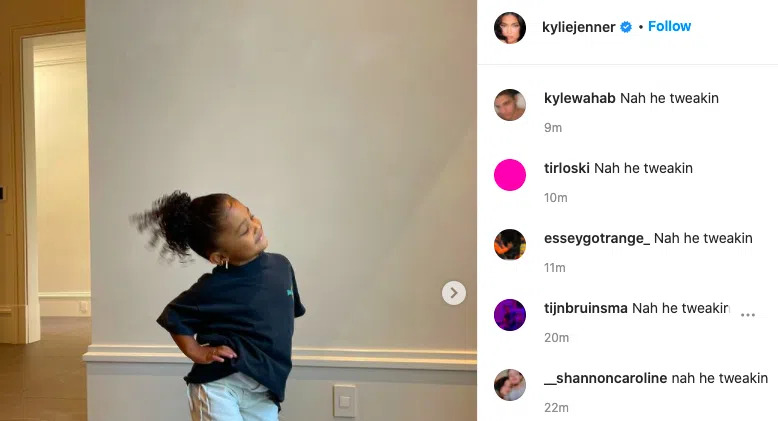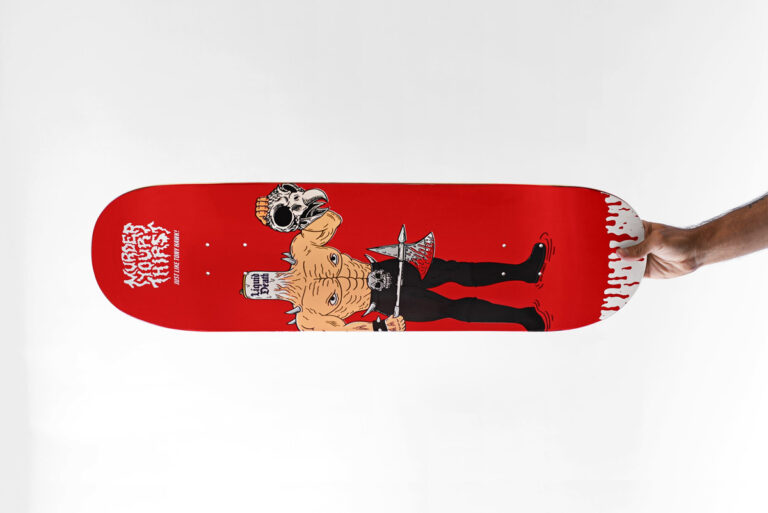Nah he tweakin: Tony Hawk’s blood-infused skateboards reignite debate over MSCHF Satan Shoes
Celebrities may be drawing blood for their merchandise but not all of them are drawing controversies. On 24 August 2021, canned water company Liquid Death—which claims to “murder your thirst”—announced its collaboration with the American skateboarding legend Tony Hawk. Harvesting blood “straight from the source” (aka Hawk himself), the limited-edition drop features 100 skateboards infused with two vials of the legend’s DNA. How, you ask? With blood mixed into a can of red paint and screen-printed by hand onto the board.
Priced at a blood-curdling (although Twitter diagrees) rate of $500, the entire drop—called the ‘Hawk Blood Deck’ for lack of a more obvious and uncontroversial term—sold out minutes after going live on 25 August. According to the company, 10 per cent of the profits will go to 5 Gyres, a nonprofit aimed at reducing plastic pollution, as well as Hawk’s own organisation, The Skatepark Project, which helps build skateparks in underserved communities.
“I am deeply thankful to have a connection with my fans, and I appreciate how Liquid Death connects with theirs,” Hawk said in a press release. “This collaboration is taking those connections to a new level, as I have literally put my blood (and soul?) into these decks.”
Just an FYI, Hawk wasn’t kidding when he included “soul?” flanked by brackets in the press release. This is because Liquid Death literally owns Hawk’s soul. “Tony Hawk is a member of the Liquid Death Country Club,” a representative of the company said in an interview with CNET. “So he previously sold his soul to Liquid Death via a legally binding contract, meaning the brand technically owns Tony’s blood.” Another chilling FYI: absolutely anyone can sell their souls to Liquid Death in exchange for early access to limited-edition merchandise, invites to private events and all kinds of other “cool shit” the company can’t tell you about yet. Just enter your full name and email and sell your soul—it’s as easy as subscribing to a newsletter.
Oh, and each board also comes with a copy of a “certificate of authenticity” signed by the legend himself. So we have legendary DNA being distributed worldwide. What could possibly go wrong? “Although it could arguably make the world a better place, never ever use these boards to make clones of Tony Hawk,” Liquid Death mentioned in a disclaimer. In the video posted to his own Instagram, Hawk worried about the skateboard owners being in possession of his DNA and shouted, “No clones!”
‘Philanthropic’ publicity stunts
2021 reboot of The Island aside, the major ingredient used in the Hawk Blood Deck must remind you of a similar collaboration that shook the internet earlier this year. Enter Lil Nas X and MSCHF’s iconic ‘Satan Shoes’.
In March 2021, internet collective MSCHF released 666 pairs of the Satan Shoes made in collaboration with rapper Lil Nas X in a PR stunt to promote the artist’s new song ‘Montero (Call Me By Your Name)’. Made using modified Nike Air Max 97s, the $1,018 trainers featured an inverted cross and a pentagram along with the words ‘Luke 10:18’ and “1 drop of human blood.” Although the shoes sold out in less than a minute, Lil Nas X was at the centre of public scrutiny for the collaboration and was repeatedly labelled “disrespectful.”
Mere hours after the shoes sold out, Nike denied its involvement in the project and filed a lawsuit—asking the court to stop MSCHF from distributing the sneakers entirely. They were later recalled as part of the settlement agreement. So is Liquid Death seeking a similar ‘viral’ reaction, minus religious references and a lawsuit?
Let’s start with responses over on Twitter. While half of the users hope Liquid Death drops more skateboards infused with Hawk’s blood in the future—with some even admitting to licking and eating them if they get their hands on it—others were quick to point out the double standards, including Lil Nas X himself.
“Now that Tony Hawk has released skateboards with his blood painted on them, and there was no public outrage, are y’all ready to admit y’all were never actually upset over the blood in the shoes?” the rapper tweeted. “And maybe u were mad for some other reason?” Others seem to echo this ‘lack of similar outrage’ point of view—with some looping racism and homophobia as possible “explainers.”
Oh, but when @LilNasX does it, it's a problem? pic.twitter.com/269UrrpgTj
— La'Ron S. Readus (@Readus_101) August 24, 2021
On the other side of this conversation, users are pointing out faults with the collaboration rather than the icon in question. “It has absolutely nothing with him being gay/black and tired of people using that as an excuse,” wrote a user. “The only reason why Lil Nas X shoe failed cause of the whole Satanic thing he was going for. He should’ve known the whole satanic thing wasn’t going to go well.” Middle ground on the platform, however, agree on the fact that they don’t want blood anywhere near their sneakers or skateboard—collectively rolling their eyes on both concepts alike.
Instagram seems to be having a mind of its own in this storm—with ‘nah he tweakin’ trending on the platform. It all started when Lil Nas X commented on a post shared by RAPTV addressing the controversy.
Summing up his opinion in three words on the platform, ‘nah he tweaking’ is now flooding the comments section of Instagram posts by big celebrities including Kanye West, Kylie Jenner and Cardi B. Although it started with human users commenting randomly, spam bots picked up on it. A few hours ago, Instagram announced that it has now muted the term from the platform entirely.
So what does ‘nah he tweaking’ mean? According to Urban Dictionary ‘tweakin’ refers to the act of not making sense of anything or saying something stupid. “Perhaps the rapper feels Tony’s blood-infused skateboards are ‘stupid’, but we’re just speculating here,” wrote HITC.


Although Hawk did not respond to the rapper’s tweet about his skateboards, he took to Twitter to note how the deck was “inspired” by the Marvel comic book based on the rock band KISS—where the band members reportedly poured their own blood into the red dye used to print the first issue.
Satan Shoes did not embed Lil Nas X’s DNA in its sole.The blood was instead drawn out of selected MSCHF employees. But maybe the rapper walked so Tony Hawk could skateboard in his blood-infused ones?
wearing my lil nas x blood shoes on my tony hawk blood skateboard
— transphobia is a sin (@dadbodyofchrist) August 24, 2021





